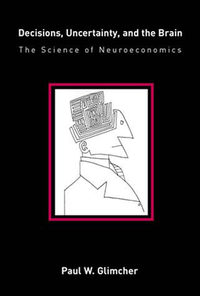Take a photo of a barcode or cover
2 reviews for:
Decisions, Uncertainty, and the Brain: The Science of Neuroeconomics
Paul W. Glimcher
2 reviews for:
Decisions, Uncertainty, and the Brain: The Science of Neuroeconomics
Paul W. Glimcher
Long excursus trough the philosophy of science and the precursor of Neuroeconomics, such as Neurobiology for example. There is also the first explanation of Nash's game theory that I maybe understood, that is to say that the book is very well written, but sometimes can be a little bit boring.
Lungo viaggio attraverso la filosofia della scienza ed i precursori della Neuroeconomia, come per esempio la neurobiologia. Inoltre in questo libro c'é anche la prima spiegazione della teoria dei giochi di Nash che forse ho capito, tanto per dire quanto possa essere ben scritto il libro, che peró potrebbe anche risultare un po' noioso.
Lungo viaggio attraverso la filosofia della scienza ed i precursori della Neuroeconomia, come per esempio la neurobiologia. Inoltre in questo libro c'é anche la prima spiegazione della teoria dei giochi di Nash che forse ho capito, tanto per dire quanto possa essere ben scritto il libro, che peró potrebbe anche risultare un po' noioso.
Not A Review!
I am sure there are out there some better books on the subject! Or there will soon be. It's scientifically and philosophically mind-bending. Even though after reading this book, it seems the author's conclusions are pretty standard and common sense yet the conflict between dualists and monists still exists at large. Either you believe in free will or you don't, there is no middle ground. Even with science coming fast and proving that everything can be explained in physical terms, lately, it seems that true uncertainty is real. And free will is both real and an illusion. It can be explained mathematically but it's still random and hard to classify.
I am already talking about the end of the book but the author makes a tremendously good job in presenting the history of biology, economics, and philosophy, sciences that concerned themselves with the study of human mind and behavior. Except for one chapter about the author's research which felt out of place and pretty difficult to understand if you're not a neurobiologist, everything else is interesting and easy to grasp.
The future of human behavior should continue on these bases. And we should remove reflex from our vocabulary, it's a theory that is outdated but unfortunately, it will stick around because it's easy to demonstrate and explain. Even though it's not correct for our knowledge and technology.
I am sure there are out there some better books on the subject! Or there will soon be. It's scientifically and philosophically mind-bending. Even though after reading this book, it seems the author's conclusions are pretty standard and common sense yet the conflict between dualists and monists still exists at large. Either you believe in free will or you don't, there is no middle ground. Even with science coming fast and proving that everything can be explained in physical terms, lately, it seems that true uncertainty is real. And free will is both real and an illusion. It can be explained mathematically but it's still random and hard to classify.
I am already talking about the end of the book but the author makes a tremendously good job in presenting the history of biology, economics, and philosophy, sciences that concerned themselves with the study of human mind and behavior. Except for one chapter about the author's research which felt out of place and pretty difficult to understand if you're not a neurobiologist, everything else is interesting and easy to grasp.
The future of human behavior should continue on these bases. And we should remove reflex from our vocabulary, it's a theory that is outdated but unfortunately, it will stick around because it's easy to demonstrate and explain. Even though it's not correct for our knowledge and technology.

